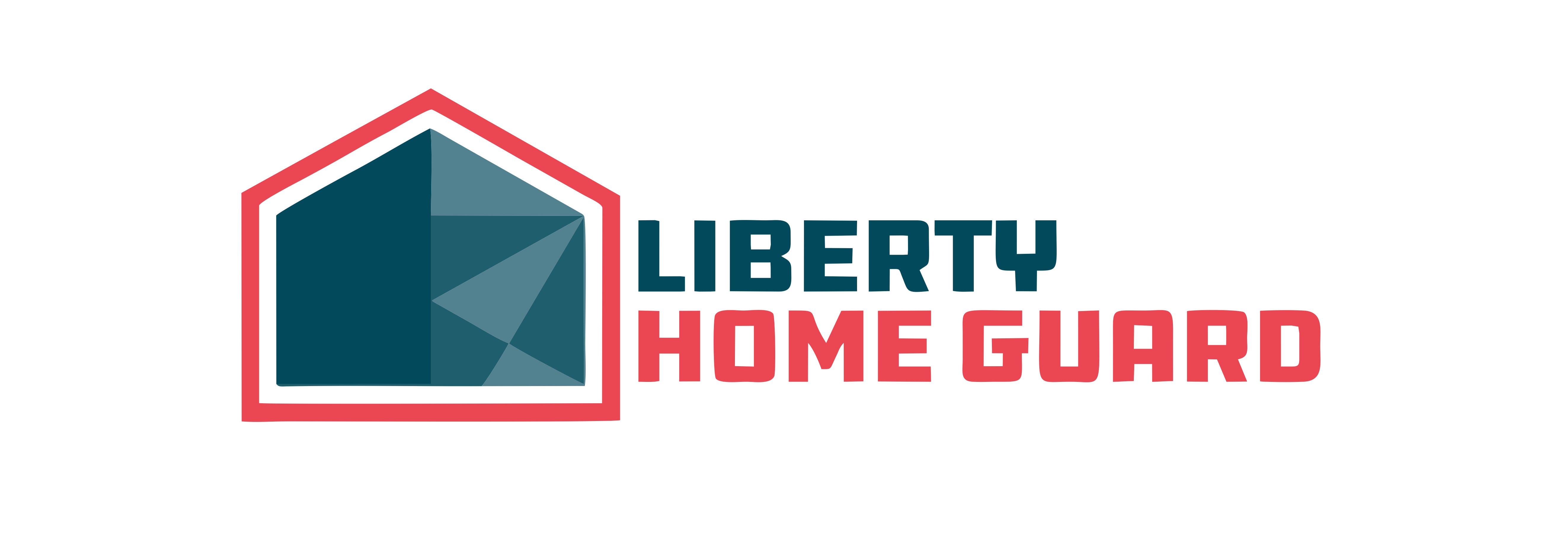How Should You Prepare Your Apartment For Pest Control?
Published Date: January 4, 2024
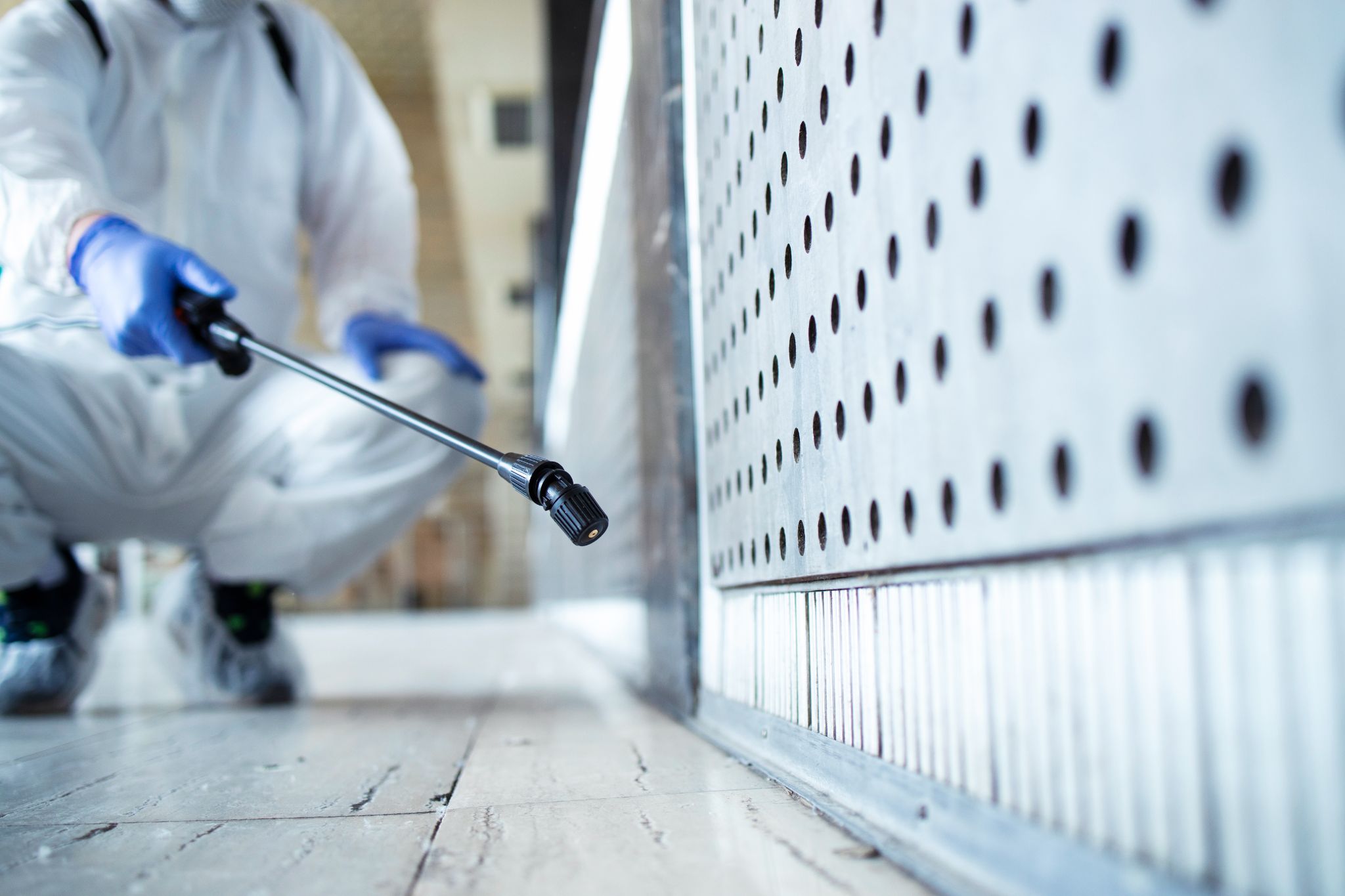
Getting ready for a pest control treatment in your apartment is a proactive step towards ensuring a pest-free living environment. Pest infestations can disrupt the peace and comfort of your home, making preparation an essential aspect of efficient pest control. You can take appropriate measures to prepare for an effective pest control program to ensure a bug-free home.
This guide will delve into the vital steps and best practices, allowing for a seamless and successful pest management process.
Prepping Your Apartment for Pest Management
Pests in your living space can be a source of frustration and discomfort. Whether it’s the quick movement of rodents or the sight of insects, these intruders can potentially jeopardize your family’s health and well-being. It is crucial to prioritize the preparation for pest control to address the issue of pest infestation.
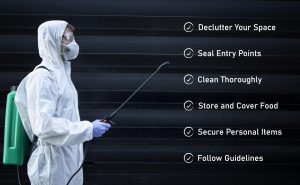
The steps for preparing your apartment for pest management are mentioned below:
Declutter Your Space
Clear away unnecessary items, and organize your surroundings to create a cleaner, more accessible environment and prevent pests from finding hiding spots.
Seal Entry Points
Identify and seal any openings, cracks, or gaps in walls, floors, or windows to block potential entry routes for pests, minimizing their access to your living space.
Clean Thoroughly
To ensure a hygienic living environment, perform a thorough cleaning that reaches into hidden spaces to eliminate current bug locations and prevent new infestations.
Store and Cover Food
Safely store food in sealed containers and cover it adequately to prevent contamination and access by pests, maintaining food hygiene and safety.
Secure Personal Items
Organize and firmly safeguard your possessions to minimize hiding spots for pests, enabling more efficient pest control methods and maintaining order in your living area.
Follow Guidelines
Adhere strictly to the guidelines and instructions provided by pest control professionals, ensuring the successful and efficient implementation of pest management strategies in your apartment.
Do I Need To Move Furniture Before Service Begins?
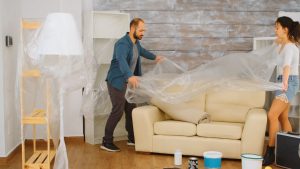
Moving furniture before the pest control service is highly advised, allowing for a more thorough and effective treatment. Items like cupboards, sofas, bedding, papers, and even luggage (if travel plans are in the pipeline) should be relocated to the center of rooms.
It will create adequate space so technicians can do their jobs effectively for the best possible outcome.
Where Do Pest Control Companies Spray In Apartments?
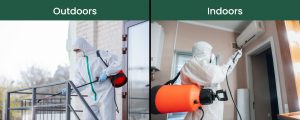
Pest control companies spray indoors and outdoors of your apartment, depending on the problem’s severity. Professionals typically target specific areas within apartments where pests potentially hide:
These areas include:
- Baseboards and Walls: Pest control professionals often spray along baseboards and walls, as these are common pathways and hiding spots for insects and other pests
- Cracks and Crevices: Spraying into cracks, crevices, and gaps in walls, floors, and ceilings helps to target areas where pests may enter or reside
- Entry Points: Points of entry such as doors, windows, and any other openings are sprayed to create a barrier and deter pests from entering the apartment.
- Kitchen and Bathroom: These areas are particularly susceptible to pests due to the presence of water and food, respectively. Pest control companies often focus on spraying around sinks, cabinets, and appliances.
- Corners and Edges: Spraying in corners, edges of countertops, and around appliances can effectively target areas where pests tend to hide or travel.
- Bedrooms and Living Spaces: Pests like bed bugs can infest bedrooms and living spaces. Pest control companies may target areas near beds, furniture, and other places where pests may harbor. To effectively deal with a bedbug infestation, thorough and professional extermination is essential.
- Utility Areas: Spraying in utility areas such as laundry rooms and storage spaces helps address potential pests’ hiding spots.
- Outdoors Adjacent to Apartments: Exterior areas near windows and doors may also be treated to create a perimeter defense, reducing the risk of pests entering the apartment.
How Long Should I Stay Out Of My Apartment After A Pest Control Treatment?
After an extermination service, waiting a certain period before re-entering your home is crucial. This waiting period allows the treatment to settle and dry, reducing potential health risks associated with exposure to the chemicals used in the pest control process.
It is advisable to stay outdoors for at least 2-4 hours after the exterminator completes the pest control treatment. The waiting time can vary based on several factors, including the type of pest control treatment applied, the chemicals used, your living space size, and ventilation.
It’s essential to follow the advice of the exterminator regarding the re-entry time to ensure the treatment’s effectiveness and safety.
What Should I Do After Treatment? Can I Mop My Home?
You are advised not to mop after pest control treatment is over, as the solutions sprayed by the exterminators dissolve automatically. Plus, the pest control technicians will ensure they leave your house in good condition and maintain cleanliness after the necessary treatment is completed so that you don’t have to worry about anything.
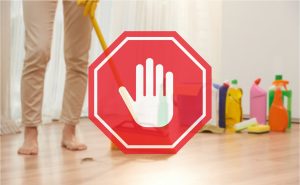
Instead, once pest control treatment is completed in your apartment, you can return your furniture to its corners. If you have stored any food items inside your fridge that do not require to be kept indoors, the items can get stored back on shelves.
Also, once pest control treatment is completed, you can bring your pets back indoors, as it is safe for them to move around the home freely.
Know what to do after pest control to ensure the effectiveness of the treatment and prevent future infestations.
How Long Does An Exterminator Spray Last?
It depends on the pests treated and what exterminators spray in the given situation. For instance, treatment for bed bugs should last permanently if the treatment is carried out accurately. On the other hand, treatment for spiders only lasts for three months.
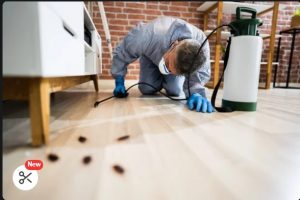
Usually, the exterminator’s spray lasts from a few months to a year or so. The longevity of it largely depends on various factors:
- Type of Pesticide Used: Different pesticides have different residual effects. Some last a few weeks, while others may protect for several months.
- Environmental Conditions: Factors like weather, temperature, and humidity can affect the effectiveness of the spray. Extreme weather conditions may reduce the spray’s longevity.
- Resistance of Pests: Pests can sometimes resist certain pesticides over time, reducing the spray’s effectiveness. Rotating or alternating pesticides can help mitigate this resistance.
- Sunlight Exposure: Over time, continuous exposure to direct sunlight might cause the pesticide’s ability to reduce. Areas that receive direct sunlight might need the spray reapplied more frequently.
- Application Method: How the spray is applied, whether as a residual or a spot treatment, impacts its effectiveness.
- Professional Expertise: The pest control company’s skill, expertise, and knowledge of the spray’s appropriate application can influence its effectiveness and duration.
Preparing For Chemical And Non-Chemical Extermination Process
Preparing for both chemical and non-chemical extermination processes is essential to ensure the safety and effectiveness of pest control measures. Here’s how to prepare:
For Chemical Extermination
Using chemical extermination methods for pest control can effectively manage pest infestations when applied correctly and safely. It highlights that pesticide exposure is a significant concern and that misuse of these products can harm human health.
Several key points and recommendations should be considered to address these concerns and ensure the safe and effective use of chemical pesticides:
- Pesticide Hazards: Many pesticide products available off the shelf can be hazardous if stored, handled, applied, or disposed of improperly
- Temporary Solutions: Chemical pesticides often provide temporary solutions, and repeated treatments may be necessary
- Pesticide Resistance: Over time, some pests can become resistant to the chemicals, necessitating alternative products or methods
- Importance of Proper Use: Incorrect use of home-use pesticide products can be harmful or poisonous to humans
- Basic Steps for Reducing Risks: The basic steps for reducing pesticide risks include selecting the right product, reading the product label, determining the correct amount to use, using the product safely and correctly, and storing and disposing of pesticides properly
- Choosing the Right Product: The appropriate pesticide product is the fundamental step in minimizing pesticide-related risks
For Non – Chemical Extermination
The non-chemical process encourages using natural predators to combat pests and suggests various ways to attract and protect them. Predators like birds, bats, ladybugs, and other insects feed on harmful pests and parasitoids, such as miniature wasps, and lay eggs inside pest insects, effectively controlling pest populations.
This extermination method can be effective, but it often requires patience, consistency, and a proactive approach to pest control. If you need help with the best approach for your pest problem, consider seeking guidance from a pest control professional specializing in non-chemical methods.
To learn more about effective pest control methods, including chemical and non-chemical approaches, refer to this Citizen’s Guide on Pest Control and Pesticide Safety document.
Top Pest Service Providers
Today, several pest control companies offer services to suit your varied requirements. However, it can get tricky to recognize what pest control companies do and which is the best option that fits your needs.
We have listed the best companies offering top-quality services to cut the chase. Based on your unique requirements, scroll through these top companies and pick the best offering, and rest assured that your apartment will be pest-free as soon as service is completed.
Terminix is one of the leading pest control groups offering quality services at affordable rates.
The company offers pest solutions for ants, cockroaches, spiders, termites, bed bugs, and insects.
- Huge team to address your queries and offer top-quality services
- Customer support is available 24/7
- Plans and products come with the Terminix brand guarantee
- Partnered with the American Mosquito Control Association
- Over 90+ years of experience in the business
With over 100+ years of experience in offering top-notch pest control services, Orkin is worth considering to get rid of pests in your apartment.
The company specializes in apartment pest control treatment for centipedes, rodents, cockroaches, earwigs, bed bugs, termites, and more.
- The option of a money-back guarantee if you are not happy with the service
- 1.7 million happy customers served to date
- Well-trained technicians come over to tackle various pest problems

Ehrlich Pest Control
Ehrlich has been in business since 1928, assuring quality service to their clients.
The company eliminates ants, birds, bed bugs, cockroaches, fleas, mice, rats, rodents, snakes, etc.
- A 100% satisfaction guarantee provided by the company
- Safe products are provided so that your kids and pets stay safe
- A dedicated team of 750+ employees
- Been in the business for 90+ years
- Budget-friendly plans
Aftercare and Maintenance
Creating a pest-free living space is an ongoing effort beyond pest control treatments. Once the exterminator completes their work, implementing preventive measures becomes paramount in sustaining a pest-free environment.
Regular cleaning and proactive actions such as sealing entry points and ensuring proper food storage are crucial in preventing pests from returning. It’s a continuous commitment to maintaining a space free from unwelcome intruders.
Preventive Measures After Pest Control
After a pest control treatment, maintaining a pest-free environment requires proactive preventive measures. Regular cleaning is essential—sweep, mop, and vacuum to keep living spaces without food debris.
Seal potential entry points by filling cracks and gaps, deterring pests from re-entering. Proper food storage in airtight containers denies pests access to a potential food source and ensures a hygienic kitchen. Conduct routine home inspections to catch early signs of pest activity, allowing for timely intervention and the prevention of infestations.
Regular Cleaning Tips
Regular cleaning is a fundamental practice in preventing pest infestations. By sweeping, vacuuming, and promptly cleaning surfaces, you remove potential food sources for pests, making your home less appealing to them.
Proper garbage disposal and immediate dishwashing further discourage unwanted visitors. Storing food in sealed containers adds an extra layer of protection, minimizing the risk of attracting pests. These simple yet effective cleaning habits significantly contribute to maintaining a pest-free living space.
Conclusion
In conclusion, thoroughly preparing your apartment for exterminator services is crucial to ensure effective pest control and prevent future infestations. Equally important is selecting the right pest control company that aligns with your expectations and needs.
When you've chosen the ideal company and your apartment is primed for service, you can confidently maintain a pest-free home. Proper preparation and a reliable pest control partner are vital to enjoying a pest-free living space.
Frequently Asked Questions (FAQs)
How Does Pest Service Function?
Pest service begins with a detailed assessment, identifying the type and extent of infestation. A tailored treatment plan is devised, followed by specific treatments targeting the identified pests. Regular monitoring and preventive measures are employed post-treatment to maintain a pest-free environment.
How Much Does Pest Control Cost?
The cost for pest control services in apartments ranges between $550-$700 annually. If you opt for a monthly payment option, you must pay fees ranging from $45-50+ depending on your chosen company. On average, a good multi-family pest control company for your apartment will cost $575 per annum.
Who Is Responsible For Pest Management In A Rental Property?
In a rental property, the guidelines for pest control are usually detailed in the lease agreement or rental contract. Typically, the landlord has to ensure the absence of pests when the tenant first moves in. However, the exact details may differ based on the contract terms, local laws, and rules.
What Bugs Do Pest Control Services Cover?
Pest management services cover various annoying insects and bugs, such as cockroaches, ants, bed bugs, spiders, and termites. Moreover, they address additional pests like fleas, ticks, mosquitoes, rodents, flies, and wasps, providing thorough solutions to ensure a space free of pests.
Can We Stay Home After Pest Control?
No, it’s generally advisable to temporarily vacate your home during and immediately after a pest control treatment. The pesticides or chemicals used during pest control may pose health risks, so it’s essential to follow safety instructions provided by the pest control company.
How Long Does It Take Pest Control Treatment To Work?
In many cases, you may notice a reduction in pest activity within a few days to a few weeks after treatment. However, complete eradication may take several weeks, and follow-up treatments may be necessary to ensure long-term effectiveness.
Should I Clean Before Or After Pest Control?
It’s best to clean before pest control. Cleaning helps eliminate food sources and hiding spots for pests, making the treatment more effective. However, avoid cleaning the treated areas immediately after the pest control service to ensure the efficacy of the applied treatments.
How Far In Advance Should I Prepare For Pest Control Services?
Ideally, start preparing for pest control services 2 to 3 days in advance. This timeframe allows ample time to complete necessary tasks such as cleaning, decluttering, and making any required arrangements for pest control treatment.
Should I Inform My Neighbors About Pest Control Treatments In My Apartment?
Yes, informing your neighbors about upcoming pest control treatments in your apartment is considerate. This way, they can be aware and take any needed steps to stay prepared, mainly if it affects them in any way.
Is It Safe For My Pets To Be In The Apartment During Pest Control Treatment?
It’s generally safer for your pets to leave the apartment during pest control treatment is generally safer for your pets. The chemicals used in pest control can harm pets, so it’s advisable to relocate them temporarily to ensure their safety.
Can I DIY Pest Control Preparation, Or Should I Hire Professionals?
Hiring professionals for pest control preparation is advisable, as they have the expertise to ensure effective treatment. While you can do some basic cleaning, professionals know where pests hide and can apply treatments strategically.
Are There Any Specific Preparations For Outdoor Pest Control?
For outdoor pest control, it’s essential to prepare by clearing clutter and debris, trimming vegetation, securing trash bins, and addressing potential entry points into your home. These preparations help control outdoor pests effectively and reduce their presence in your outdoor areas.





